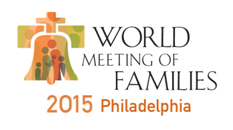 Stepping to the microphone to offer a break-out session on healing from divorce, Rose Sweet hit her crowd with honesty.
Stepping to the microphone to offer a break-out session on healing from divorce, Rose Sweet hit her crowd with honesty.
“I’ve been married and divorced three times,” she said.
“I’m here to tell you that God pulls beauty out of the ashes. The message of the church is that there is hope. You are not alone, whether you are separated or divorced. There is hope and healing for you.”
[hotblock]
A show of hands from those gathered at Sweet’s session Sept. 24 during the World Meeting of Families in Philadelphia illustrated that she was giving her message to those who needed it.
Assembled in a theater-like lecture hall, nearly everyone in the audience raised their hands when she asked how many people knew someone who was separated or divorced; a vast majority kept their hands up when she asked who among them had been separated or divorced themselves.
Sweet’s workshop, “I Am With You: Struggling With Divorce,” offered direct remedies for those who are hurting, and ways in which family members, friends and those who minister in the Church can help care for them.
“Yes, the separated and the divorced are in a unique situation” that requires compassion and care, Sweet said. “But what is not unique is that all of us suffer from anger, depression, guilt, grief, loneliness, fear, anxiety. You worry about the house. You worry about the kids. You worry about your spouse. I’ve found that healing that is available — and it’s the right healing available for the person going through separation and divorce — really applies to all of us.”
That healing comes through Christ alone, she said.
“As Catholics, as Christians, our faith and our hope in anything in life is that Jesus is with us, every day, every moment, any time that we call out to him,” said Sweet, a noted Catholic author and speaker who frequently appears on Catholic radio and on the Eternal Word Television Network. She and her husband have adult children.
Pointing to a PowerPoint image of Christ bruised and bloodied on the cross, she remarked: “Distress is a universal reality, and nobody understands this more than Christ himself.”
“Yes, it is terrifying when you learn that your spouse has another lover, or when you spouse is just done with you, or when they don’t even care about the kids. Fear can grip your heart for a long time,” she said. “But Jesus was afraid, he was betrayed, he was abandoned. He is close to the brokenhearted, and he is our answer.”
The oldest of nine children and a child of the 1950s, Sweet considered her first marriage a ticket out of the house. It lasted nine months. She divorced and sought an annulment, not even really knowing what it meant.
Twice more, she married and divorced.
“I hit the lowest of the low,” she said. “Yet, Our Lord came in and he took my pathetic little life and my offerings, and he made something very beautiful out of it. He taught me to love him first and foremost. He taught me to love his church.”
She offered four chronological steps that family, friends and those in church ministry can take in helping those suffering from separation or divorce: listen, lead, love and let go.
“Listen to their story first. They don’t need your advice or counsel right away; they need you to listen to their pain and their story,” she said.
“When you establish that relationship, lead them to Jesus, lead them to the truth,” Sweet offered.
“And love them, no matter how they respond to the truth and to the love of Jesus,” she said.
“Finally, let go. This is the hardest part sometimes,” she acknowledged. She advised against pressing to offer them more counsel, Bible quotes, or dinners to discuss the subject. “Let them go. God always proposes, never imposes. … Let them go for God to find a way to reach their hearts. This doesn’t mean let go of the person or your love for them, but let go of your own fears, worry and anxiety for them.”
Sweet acknowledged that many separated and divorced Catholics have felt ostracized, criticized or abandoned by the church and her members.
“You can trust the church,” she said, “but not everyone in her. A lot of the reasons that the separated and divorced have felt so estranged and rejected is because many people just don’t know what to say or do.”
She called upon parishes to direct Catholics who are separated and divorced to ministries and outreach programs designed specifically for their needs, and to practice listening, leading, loving and letting go: “Listen without an agenda. Use your eyes and your ears and your heart. Lead without pushing or pulling, and be content that you’ve done your part. Love without reservation, no matter what they do, and let go without hesitation, because that’s how God loves you.”
***
Reed is managing editor of The Catholic Witness, newspaper of the Diocese of Harrisburg.
PREVIOUS: The cardinal and the pastor urge emphasizing the positive
NEXT: Six families received Gospels from pope at Philadelphia Mass


Share this story